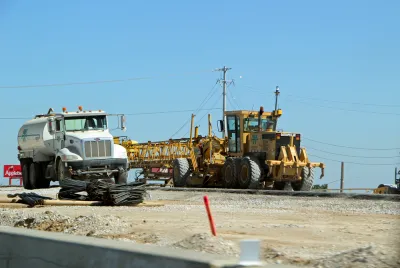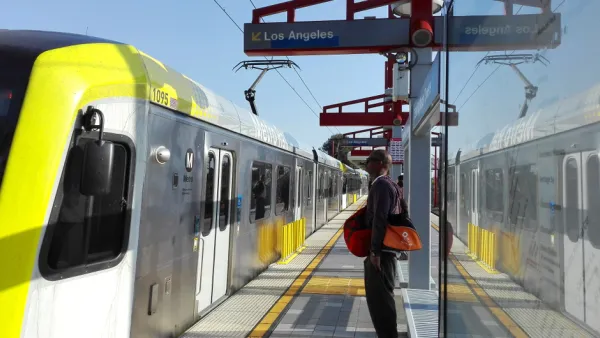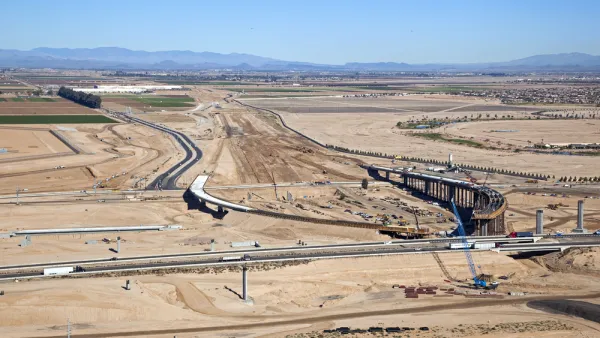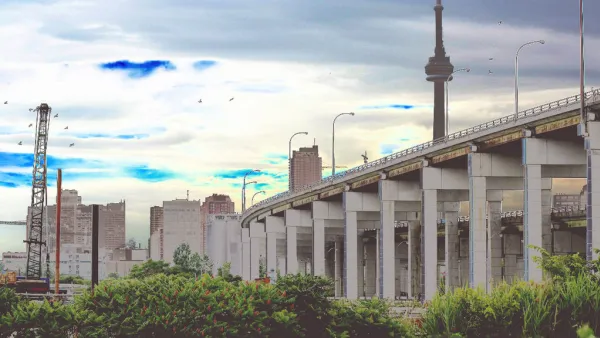U.S. transit projects have a much harder time getting environmental approval than road projects, perpetuating the dominance of cars in U.S. transportation policy.

Henry Grabar questions the logic of environmental review processes that delay transit projects and, counterintuitively, ease the way forward for highway construction. "[O]n the eve of a once-in-a-generation federal investment in infrastructure," Grabar writes, "the environmental review process for big projects is totally unfit for the task at hand. Transportation is the country’s largest source of carbon emissions, but ideas that aim to reduce dependence on planes, cars, and trucks have even more trouble gaining environmental approval than highways."
An "analysis of 180 projects here and abroad found that U.S. projects cost 50 percent more and take 18 months longer to conclude than similar projects abroad," in part because "American transit builders use environmental reviews as an opportunity to plan routes and engage with the community, transforming what might be a cut-and-dried assessment into an interminable back-and-forth."
Meanwhile, "the ease with which highways get funded and constructed, observes Joe Cortright at the think tank City Observatory in Portland, Oregon, makes it harder in turn for transit to prove its success" and helps, as Grabar puts it, "perpetuate the dominance of ice cap–melting SUVs in American transportation policy." A nationwide policy similar to California's 2020 decision to "exempt sustainable local transportation projects from undergoing analysis under the California Environmental Quality Act for the next four years" could alleviate the problem and give transit projects a fighting chance.
FULL STORY: The Perverse Reason It’s Easier to Build New Highways Than New Subways

Analysis: Cybertruck Fatality Rate Far Exceeds That of Ford Pinto
The Tesla Cybertruck was recalled seven times last year.

National Parks Layoffs Will Cause Communities to Lose Billions
Thousands of essential park workers were laid off this week, just before the busy spring break season.

Retro-silient?: America’s First “Eco-burb,” The Woodlands Turns 50
A master-planned community north of Houston offers lessons on green infrastructure and resilient design, but falls short of its founder’s lofty affordability and walkability goals.

Test News Post 1
This is a summary

Analysis: Cybertruck Fatality Rate Far Exceeds That of Ford Pinto
The Tesla Cybertruck was recalled seven times last year.

Test News Headline 46
Test for the image on the front page.
Urban Design for Planners 1: Software Tools
This six-course series explores essential urban design concepts using open source software and equips planners with the tools they need to participate fully in the urban design process.
Planning for Universal Design
Learn the tools for implementing Universal Design in planning regulations.
EMC Planning Group, Inc.
Planetizen
Planetizen
Mpact (formerly Rail~Volution)
Great Falls Development Authority, Inc.
HUDs Office of Policy Development and Research
NYU Wagner Graduate School of Public Service




























